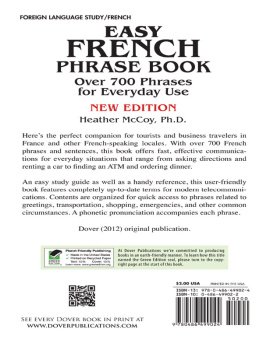UNTITLED

EASY
FRENCH
PHRASE
BOOK
NEW EDITION
Over 700 Phrases
for Everyday Use
Heather McCoy, Ph.D.
DOVER PUBLICATIONS, INC.
Mineola, New York

Copyright
Copyright 2012 by Dover Publications, Inc.
Text copyright 2010 by Heather McCoy
All rights reserved.
Bibliographical Note
Easy French Phrase Book NEW EDITION: Over 700 Phrases for Everyday Use, first published by Dover Publications, Inc., in 2012, is a new selection of material from 1001 Easy French Phrases, published in 2010 by Dover Publications, Inc.
Library of Congress Cataloging-in-Publication Data
McCoy, Heather.
Easy French phrase book : new edition : over 700 phrases for everyday use / Heather McCoy. New ed.
p. cm.
Text in English and French.
ISBN-13: 978-0-486-49902-4
ISBN-10: 0-486-49902-2
French languageConversation and phrase booksEnglish. I. Title.
PC2121.M55 2012
448.3'421dc23
2012019698
Manufactured in the United States by Courier Corporation
49902201
www.doverpublications.com
Table of Contents
INTRODUCTION
French Pronunciation
Scheme of Pronunciation
Chapter 1: Greetings and Everyday Expressions
Greetings, Introductions, and Social Conversation
Making Yourself Understood
Useful Words and Expressions
Describing Yourself and Others
Difficulties
Numbers and Telling Time
Talking about Days of the Week and Months
Talking about the Weather and Seasons
Chapter 2: Travel
Travel: General Vocabulary and Expressions
Tickets
Traveling by Car
Air Travel
Customs and Baggage
Traveling by Train
Taking the Bus
Taxi!
Taking the Subway
Traveling on Two Wheels
Going on Foot
At the Hotel
Chapter 3: Mealtimes
Talking about Mealtimes and Eating: General Expressions
Dining Out
Menu: General Items
Breakfast
Appetizers, Lunch Items, and Salad
Main Course
Fruits and Vegetables
Dessert
Beverages
Chapter 4: Leisure Activities
Sightseeing
Interests and Hobbies
Sports
Houses of Worship
Chapter 5: Shopping
Banking and Money
Shopping
Measurements
Colors
Chapter 6: Health and Well-being
At the Pharmacy
Seeing a Doctor
Seeing a Dentist
Chapter 7: Communications
The Post Office
The Telephone
The Internet and Computers
ACKNOWLEDGMENTS
INDEX
Introduction
This book is designed for the traveler or casual user of French who is looking for a handy and manageable guide to basic French phrases. The phrases included in this convenient volume are some of the basic tools for communication and comprehension that you are likely to need in a variety of French-speaking contexts.
The primary focus of Easy French Phrase Book NEW EDITION is daily communication. You will find linguistic structures that focus on describing yourself and others; asking simple questions that one might need when traveling; and interacting in a variety of situations. The phrases have been organized thematically so that you can easily find vocabulary and sentence structures that apply to a specific context. Special attention has been paid to organizing phrases so that you can substitute the vocabulary you need in order to create your own meaning, such as in the following example:
Je voudrais prendre (I'd like to have )
une bire (a beer)
un caf (a coffee)
You will be able to use this book in a variety of ways, either by preparing for a trip by reading a few sections a day, or by using it on-the-spot by flipping to the section that is most pertinent at that moment. Our hope is that you will find the phrases useful and flexible, enabling you to effectively create your own meanings.
French Pronunciation
Easy French Phrase Book NEW EDITION uses a phonetic transcription as an aid to correct pronunciation. (See Scheme of Pronunciation, below.) This transcription is located directly beneath the French entry in the text. Here are some general principles of pronunciation:
Nasalization
In French, a vowel is nasalized when it is followed by a single m or n in the same syllable. The transcription of these nasalized vowels appears as:
-an, -am, -em, -en - > ahn, ehn
-in, -im - > ihn, ihm
-on, -om - > ohn, ohm
-um, -un - > uhn
To produce a nasalized vowel, quickly pass the air through both the nose and the mouth at the same time. The m or n isn't pronounced after the nasal vowel, as follows:
franais - > frahn-say; temps - > tahn
pain - > pihn; printemps - > prihn-tehn
bon - > bohn
quelqu'un - > kell-kuhn
Silent Final Consonants
In French, most consonants at the end of a word are silent, although there are exceptions to this rule: c, f , and l . The consonant r also is pronounced, but is silent when occurring in the endings -er and -ier.
The French r
The French r can be one of the most challenging sounds for English speakers to pronounce. Pronunciation of the r will depend upon the region of the French-speaking world that you are visiting. In some areas, the French r can resemble the Italian or Spanish r produced by rolling it on the tip of the tongue. The Parisian r is a more gutteral sound: it's helpful to imagine the sound being produced in the back of the throat, the same place that produces the h in ahoy. The r is voiced, meaning that there is a slight vibration of the vocal cords.
The Plural s
As mentioned above, consonants at the end of words normally are not pronounced. Make special note of this when pronouncing the s that denotes the plural:
Le chat - > luh-shah
Les chats - > lay-shah
Notice how the pronunciation of the noun chat does not change between the singular and the plural. This is quite different from English, and is important for English speakers to remember.
Liaison
A final consonant that is normally silent is pronounced when it comes before a vowel or h . This phenomenon is called liaison . Note the following change:
A final s before a consonant: des livres - > day-leev-ruh
A final s before a vowel: des animaux - > daze-ehn-ee-moh
The rules for liaison can be somewhat complex, so simply pay attention to the phonetic transcriptions in order to get a feel for when its usage is appropriate.
Stress
The last syllable of a French word is usually stressed:
Beaucoup - > boh- koo
However, when the last syllable is an unstressed e ( uh in the transcription used here), the next-to-the-last syllable receives the stress:
Formidable - > for-mee- dah -bluh
You will also notice that in addition to the stress at the end of a word, there also is stress at the end of a phrase:
Je suis amricain et travaille au muse d'art contemporain. - > zhuh swee za -mary- kihn ay tra-vy oh moo- zay dar cohn- tehn -por- ihn .
Scheme of Pronunciation


EASY
FRENCH
PHRASE
BOOK
NEW EDITION
Chapter 1













